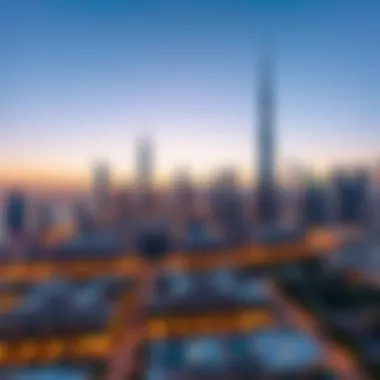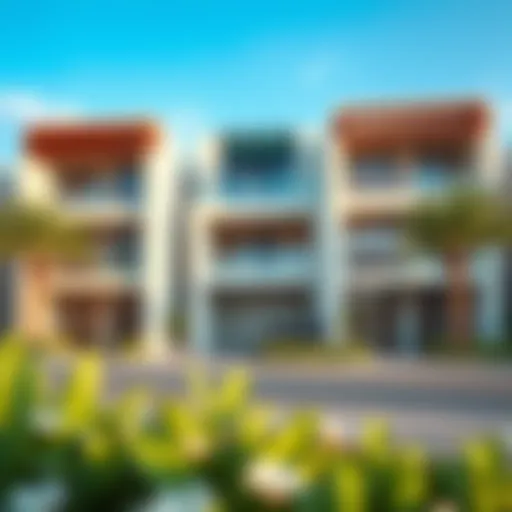Navigating Real Estate Development in Dubai


Intro
The real estate scene in Dubai is something else. It’s not just about buying a fancy apartment or investing in commercial properties; it’s a canvas where demand meets innovation, creating remarkable architectural feats. With the rapid changes that have colored the market over the years, understanding what makes this sector tick is essential for anyone looking to dip their toes into property waters in this part of the world.
Dubai has transformed from a quiet trading post into a global hub, attracting investors from every corner of the globe. Whether you’re an expatriate wanting to settle down, a developer looking to make your mark, or a buyer eyeing potential investments, knowing how the market operates is crucial.
Diving into this article, you’ll discover various factors that influence the real estate ecosystem. From current trends to investment strategies, we’ll cover the nuances that form the backbone of this vibrant market. As we peel back the layers, you will gain insights that not only equip you with knowledge but also make you feel more confident about navigating the complex terrain of real estate development in Dubai.
Now, let’s take a closer look at the market insights that shape this dynamic environment.
Overview of Dubai's Real Estate Landscape
The real estate market in Dubai is like a bustling bazaar – it's alive with opportunities but requires an astute eye to navigate. This landscape is crucial not just for investors and developers but also for every potential buyer and expatriate looking to stake their claim in this vibrant economy. With each property transaction, the dynamics of this sector reveal itself, making it essential to understand the intricate weavings of its past, present, and future.
Historical Background
Diving into the historical context of Dubai's real estate development unveils a remarkable transformation from a modest fishing village to a global metropolis. The oil boom in the 1970s marked a pivotal turning point, igniting rapid infrastructural development. Buildings sprouted like daisies after rain, shaping a cityscape characterized by ambitious architecture and luxurious amenities.
Key milestones include the establishment of the Dubai Land Department in 1960, which set the groundwork for property regulations. Fast forward to the early 2000s, when freehold property ownership for foreigners was introduced, a move that enhanced investor confidence and drew a flood of international interest. The Urban Development Law launched in 2009 further reinforced the legal framework that governs real estate activities, emphasizing the need for orderly growth and sustainability.
Current Market Trends
Currently, the real estate sector in Dubai exhibits a fluidity that can be both enticing and daunting. The market is currently witnessing a resurgence in interest, spurred on by government initiatives aimed at diversifying the economy beyond oil dependence. Key trends dominating the scene include:
- Increased demand for mixed-use developments: Projects like Dubai Creek Harbour and Dubai Hills Estate showcase integrated living where residential, commercial, and leisure spaces coexist harmoniously.
- Sustainability focuses: There’s a notable shift towards eco-friendly buildings, with regulations pushing developers to adhere to green building standards.
- Technology integration: The emergence of PropTech has changed how transactions are executed and how properties are marketed. Virtual tours, digital transactions, and data analytics are becoming the norm, creating a more efficient process.
- Competitive pricing: Price adjustments are seen as developers strive to attract buyers. While luxury properties still attract high-end investors, affordable housing is now on the rise, catering to a broader audience.
"The Dubai property market is full of surprises. Understanding its pulse can mean the difference between a wise investment and a missed opportunity."
Future Projections
Looking ahead, the future of Dubai's real estate landscape is likely to be shaped by several influential factors. The Dubai Expo 2020, though impacted by the pandemic, still serves as a catalyst for growth and infrastructure enhancement, showcasing Dubai on a global stage. As more investment flows in, predictions indicate that the luxury market will plateau while affordability continues to gain traction.
Moreover, as global events change the economic climate, Dubai's strategic location as a business hub will continue to attract expatriates and investors. This may lead to shifts in consumer preferences, emphasizing the need for flexibility in development strategies. New technological adjustments, driven by digital trends, promise to redefine client interactions, paving the way for developments like smart cities.
Understanding the dynamics of these trends is vital for anyone involved in the real estate market in Dubai, as it not only informs strategic investment decisions but also helps grasp the evolving needs of the market.
Key Drivers of Real Estate Development
Understanding the key drivers of real estate development in Dubai is crucial for successful investment and navigating the local market landscape. Each of these drivers contributes to the dynamism seen in property trends, market behaviors, and investment opportunities. As a bustling metropolis in the Middle East, Dubai offers a variety of factors that not only attract investors but also shape the development scenarios. Delving into the economic factors, technological advancements, and cultural influences provides a clearer picture of what propels this market forward.
Economic Factors
The economic landscape in Dubai is a vibrant tapestry of growth and diversification. Factors like GDP growth, population increase, and employment rates are steering forces behind property demand. Recently, Dubai has made strides in diversifying its economy; it’s not just about oil anymore. With tourism, finance, and logistics becoming pillars of its economy, the real estate market has seen a rise in demand for both residential and commercial properties.
Moreover, the Expo 2020 event (held later due to the pandemic) brought about a wealth of investment in infrastructure and services, enhancing the appeal of Dubai as a global hub. Exporting a business-friendly environment, many foreign companies are flocking to this emirate. As the number of residents and visitors swells, so does the appetite for living and working spaces.
"Economic conditions can make or break the real estate scene. Understanding the pulse of the market is vital for savvy investors."
With rental yields generally hovering around 7-9%, properties in key areas become attractive assets for those looking to tap into Dubai’s potential while the market adjusts.
Technological Advancements
Technology is changing the landscape of real estate development in Dubai at a phenomenal pace. From the application of Artificial Intelligence in property evaluation to Smart City innovations, the effects of tech are palpable. The rise of PropTech has allowed for greater efficiency, with tools that streamline processes for developers and real estate agents.
Digital platforms offer investors a transparent view of the market, helping them make informed decisions quickly. Virtual reality is redefining property viewings, allowing buyers to explore spaces from afar, which is particularly useful for international investors and expats. Integrating technology also leads to smarter constructions, aligning with sustainable practices and green technologies.
Additionally, data analytics plays a pivotal role in understanding buyer behavior and determining market needs. These insights can guide developers on how to tailor their projects. Embracing tech isn’t just about following trends; it’s about staying competitive in an ever-evolving market.
Cultural Influences
Cultural nuances play a significant role in shaping Dubai's real estate development. The city is a melting pot of cultures, with expatriates making up over 80% of the population. This diversity influences housing demands and preferences, driving the need for varied property offerings. The local and foreign buyers often have different expectations from residential spaces — ranging from amenities, community aspects, to interior design styles.
Understanding local customs can help developers create spaces that resonate with buyers. Community-centric living has grown in popularity, with buyers looking for spaces that foster a sense of belonging and lifestyle amenities. Such preferences can dictate everything from the design of complexes to the communal facilities developers include.
As Dubai continues to forge its identity in a global arena, real estate development will increasingly reflect these cultural dynamics, positioning properties that not only meet living needs but embody the rich tapestry of its inhabitants.'
Regulatory Framework
The regulatory framework governing real estate development in Dubai plays a crucial role in shaping its dynamic market. It consists of laws, regulations, and guidelines that impact various aspects of property investment and development. Understanding this framework is essential for investors, buyers, real estate agents, and developers, as it influences both the potential benefits and challenges within the market.
A robust regulatory framework establishes the rules of the game, ensuring a transparent and fair environment for all parties involved. It protects investors from unforeseen risks while fostering a positive atmosphere for development. The effectiveness of these regulations determines investor confidence and can attract foreign investments, fueling further growth in the sector.
As we further break down the elements within this framework, we'll see how each component interconnects to form a sustainable and thriving real estate environment.
Property Ownership Laws
Property ownership laws in Dubai are a significant aspect of the regulatory framework. These laws define who can buy or own property, what types of properties are available for foreign investors, and the conditions of ownership. In certain areas, such as freehold zones, non-UAE nationals can purchase properties with full ownership rights, providing them with a unique opportunity to invest.
Additionally, laws stipulate the obligations of property owners, ensuring they adhere to conditions related to maintenance, service charges, and more. This clarity makes it easier for international buyers to navigate the complexities of property acquisition, reducing the chances of legal mishaps.
Here are key features of the property ownership landscape in Dubai:
- Freehold Ownership: Allows foreign buyers full ownership and rights to the property.
- Leasehold Ownership: Typically gives control over a property for a specific period (usually 99 years), best for those not looking for permanent ownership.
- Specific Areas for Investment: Logoed developments like Downtown Dubai and Dubai Marina have specific regulations.
Understanding these nuances is vital for anyone looking to invest.
Developer Regulations


Developer regulations ensure that real estate projects meet necessary standards and comply with safety, legal, and environmental requirements. In Dubai, the Real Estate Regulatory Agency (RERA) oversees developers to maintain quality in construction and align developments with city plans.
This regulation guards consumers against fraud and poor-quality work, ensuring that any project meets the high standards expected in Dubai. Developers must adhere to timelines, quality benchmarks, and safety protocols, which safeguards buyers' interests.
Some critical elements of developer regulations include:
- Licensing: All developers must obtain the appropriate licenses before commencing a project to demonstrate their legitimacy.
- Project Details Disclosure: Transparency is paramount. Developers need to disclose project details to prospective buyers, including completion dates and specifications.
- Financial Regulations: Developers must provide a bank guarantee that safeguards buyers’ funds, adding an extra layer of security.
These regulations help cultivate trust and assure buyers of their investments’ safety.
Investment Incentives
Investment incentives are designed to encourage both local and foreign investors to participate actively in Dubai's real estate market. The government of Dubai has set forth various incentives to make the property market attractive and competitive.
One of the standout incentives is the absence of property taxes and capital gains taxes for investors, which remarkably enhances the return on investment. Additionally, the government has introduced several visa options for property buyers, including long-term residency visas, which encourage expatriates to invest in real estate.
Key investment incentives include:
- Mortgages for Foreigners: Financial institutions in Dubai offer attractive mortgage options, making it easier for foreigners to invest.
- Flexible Payment Plans: Many developers offer installment plans, allowing buyers to manage their cash flow while securing a property.
- Participation in Free Zones: By investing in designated free zones, investors often enjoy tax benefits and full ownership privileges.
These incentives are integral to drawing in a diverse array of investors and maintaining vibrancy in Dubai's real estate sector.
"Understanding the regulatory framework is not just about compliance; it's about grasping the very essence of market stability and investment security."
Navigating the regulatory landscape in Dubai's real estate market remains an essential endeavor for anyone involved or interested in investment. By familiarizing oneself with ownership laws, developer regulations, and available incentives, stakeholders can position themselves strategically in this ever-evolving market.
Key Stakeholders in Dubai's Real Estate Market
In the bustling and ever-evolving real estate market of Dubai, understanding the key stakeholders is crucial for anyone looking to make headway in this arena. These individuals and groups play significant roles in shaping the landscape of property development, investment decisions, and overall market dynamics. From the seasoned investors to the ambitious buyers, each stakeholder has a unique perspective and contribution that influences the market. Therefore, grasping the intricacies of these roles not only enhances one's understanding of the market, but it also aids in navigating through the complexities of property transactions and investments.
Investors
Investors are often the backbone of Dubai's real estate market. They come in all shapes and sizes, ranging from individual buyers looking for their dream home to large firms pooling resources to fund massive developments. With the potential for high returns, many see Dubai as a golden opportunity.
Investors often evaluate properties based on a variety of factors. Rental yields, property appreciation, and market demand are critical elements they consider before committing their funds. They tend to favor locations that promise growth and liquidity. For instance, regions like Downtown Dubai and Dubai Marina are hot spots due to their strategic locations and amenities, drawing both foreign and local buyers.
Here, due diligence is crucial. Investors must stay informed about legal frameworks and emerging trends, ensuring they do not put their hard-earned money at risk. Furthermore, the diverse range of investment options from residential to commercial properties necessitates being strategic about portfolio diversification.
Developers
In this intricate web, developers are the creators, breathing life into visions that shape Dubai's skyline. They possess the expertise to transform land into habitable spaces, be it homes, offices, or leisure facilities. Their role extends beyond construction; they navigate zoning laws, acquire permits, and establish partnerships with architects and contractors.
While not every developer is a household name, many leave a lasting impact through signature projects. Their ability to forecast market demands and innovate according to changing needs is indispensable. They often invest in green technologies and sustainable practices too, in response to increased awareness of environmental issues. The competition among developers to deliver quality can lead to more appealing offerings for investors and buyers alike.
Real Estate Agents
Real estate agents serve as the bridge between buyers and sellers, offering valuable services that facilitate transactions. Their intimate knowledge of the local market enables them to provide insights on market trends, property valuations, and negotiation strategies. Agents often specialize in particular areas or property types, allowing them to offer tailored advice according to clients' needs.
Engaging a reputable agent can be particularly beneficial for foreign investors unfamiliar with Dubai’s regulations and cultural nuances. Agents can assist buyers in navigating through paperwork and legal considerations, simplifying the often daunting process of purchasing property. They also act as advocates for buyers’ interests, ensuring that negotiable aspects are addressed honestly and transparently.
Buyers
Buyers are, without a doubt, at the heart of the real estate market. They range from local residents and expatriates to international investors looking to tap into Dubai's vibrant market. Their motivations for buying can vary widely—from the search for a stylish new home or an investment asset to securing a vacation property.
Understanding buyer sentiments is paramount for both developers and investors. Preferences fluctuate with market conditions, and many buyers are increasingly leaning towards sustainable living options. Moreover, affordability and financing remain critical factors influencing buyers' decisions. With many financing options available, potential buyers are urged to research thoroughly, keeping in mind their long-term financial goals before making a commitment.
"In the end, the success of real estate investment in Dubai hinges not just on property value, but also on the relationships among its stakeholders."
In summary, recognizing the roles of investors, developers, real estate agents, and buyers is vital for comprehending Dubai's intricate real estate landscape. By understanding their perspectives and how they interact, market participants can foster better opportunities and outcomes in this dynamic environment.
Emerging Neighborhoods in Dubai
Emerging neighborhoods in Dubai hold a pivotal role in shaping the city's real estate landscape. As the real estate market evolves, new districts are developing rapidly, offering unique opportunities for investors, buyers, and developers alike. These areas often experience growth and transformation due to a combination of various factors such as infrastructure investments, government initiatives, and demographic shifts. As more residents and businesses flock to these locales, understanding their characteristics, benefits, and potential challenges becomes essential for stakeholders aimed at making informed decisions in the dynamic property market.
Downtown Dubai
Downtown Dubai stands as a stellar example of urban luxury. Known for its iconic skyscrapers like the Burj Khalifa, this area is also home to the expansive Dubai Mall and various cultural attractions. The neighborhood blends modernity with tradition, drawing a diverse crowd of tourists and residents. The anchoring elements of lifestyle, retail, and entertainment make Downtown Dubai not just a coveted address but also a resilient investment option. Moreover, the ongoing developments and maintenance of infrastructure promise a lively environment for the foreseeable future.
From an investor's perspective, properties here typically see substantial appreciation due to location desirability. However, potential buyers should be aware of their budget limitations, as property prices reflect the highly sought-after status of the area. But in the long run, renting or buying in Downtown Dubai remains a wise financial gamble given its persistent popularity.
Dubai Marina
Dubai Marina is a bustling waterfront community that has gained significant traction in recent years. With its impressive skyline, high-end dining options, and recreation facilities, it attracts both local and expatriate populations. The area is designed for those who appreciate an urban lifestyle complemented by a vibrant community feel.
For investors, Dubai Marina presents multiple opportunities; from residential apartments to retail spaces, the demand continues to outstrip supply. This neighborhood also boasts excellent connectivity to public transport, including the Dubai Metro, making it an attractive option for professionals commuting to the business districts. Nonetheless, the competition among properties can make it a challenging environment for buyers, especially with the prices often inflating as developments unfold.
Al Quoz
Al Quoz showcases a distinct contrast to the luxury of other neighborhoods. This area is rapidly transforming, emerging as the heart of Dubai's art and creativity scene. Previously seen as an industrial zone, Al Quoz has evolved into a vibrant hub for artists, galleries, and trendy cafes.
Interest in Al Quoz has surged, thanks to the rise of cultural events and initiatives aiming to promote local talent. For investors, the potential for property appreciation is promising given its transitioning nature. However, it's critical to do thorough research, as the market may not be as predictable as the more established neighborhoods.
Dubai Creek
As one of Dubai's historically significant areas, Dubai Creek offers a unique blend of the past and future. Located at the heart of the city, it has been revitalized to include mixed-use developments, parks, and waterfront promenades. The Creek plays a crucial role in preserving cultural heritage while accommodating modern tourism and residential needs.
Investment opportunities here span from luxury waterfront apartments to retail spaces aimed at both visitors and residents. The ongoing development projects, such as the Dubai Creek Tower, indicate the keen interest of the government in enhancing this area's appeal. Yet, potential buyers should consider the evolving dynamics and market competition from nearby developments.


"Understanding the nuances of emerging neighborhoods can make all the difference for investors aiming to make a mark in Dubai's dynamic market."
Investment Strategies for Potential Buyers
Navigating the real estate market in Dubai can often feel like steering a ship through turbulent waters. With its unique blend of opportunities and challenges, understanding investment strategies is critical for potential buyers looking to secure their financial future in this dynamic city. This section delves into key elements that shape effective investment approaches, spotlighting the benefits and considerations that underpin successful property acquisitions.
Research and Analysis
Diving into research is the foundation of any sound investment strategy. Potential buyers must be equipped with a thorough understanding of the market landscape before making a move. This involves analyzing current trends in property prices, types of properties that attract buyers, and the neighborhoods seeing the most growth.
Using data from reliable sources, such as government publications and real estate platforms, buyers can grasp the pulse of the market. Websites like abu dhabi.gov.ae provide valuable insights into current property laws and regulations, ensuring that investors remain compliant.
Before sealing a deal, it’s also wise to benchmark properties against similar listings. Factors such as amenities, construction quality, and proximity to essential services can lend perspective on a property’s market value. A well-planned research phase helps mitigate financial risks effectively, proving itself beneficial in the long run.
Diversification of Portfolio
When it comes to real estate, putting all eggs in one basket can be risky. Diversifying one’s investment portfolio across various property types—residential, commercial, or even vacation rentals—can cushion a buyer against market fluctuations. Each property segment carries its own set of risks and rewards; for example, while residential properties may provide steady rental income, commercial spaces might yield higher returns if located in thriving business districts.
Moreover, potential buyers should also consider emerging neighborhoods in Dubai, which often present more affordable options with significant appreciation potential. By investing in a mix of established areas and up-and-coming locations, they strike a balance that strengthens their overall portfolio.
Long-term vs Short-term Investments
Determining the right investment horizon can make all the difference.
- Long-term Investments: For those who prefer stability and potential for appreciation, holding properties over extended periods is advantageous. Dubai's infrastructure developments and economic growth projections hint at a burgeoning increase in property values, making long-term investments appealing. Additionally, investors tapping into long-term rentals can often enjoy steady cash flow while capitalizing on rising demand.
- Short-term Investments: Conversely, short-term flips can be enticing for those with a keen sense for market timing and renovation opportunities. Quick turnarounds on properties can yield immediate profits, particularly in a vibrant market like Dubai. However, this strategy requires thorough market insight and the readiness to weather possible downturns.
Challenges in the Market
Understanding the challenges in the Dubai real estate market is essential for anyone looking to invest or engage in this dynamic field. The sector, while vibrant and lucrative, is not without its hurdles. A clear grasp of these challenges not only leads to wise decision-making but also prepares stakeholders for potential pitfalls.
Market Volatility
Market volatility is a phrase that pops up often, but in the context of Dubai, it rings particularly true. An investor entering the scene should be aware that fluctuations can be dramatic. Prices may rise steeply during a boom, only to plummet during economic downturns.
- For instance, looking back at the 2008 financial crisis, Dubai's real estate values saw a significant dip, impacting many stakeholders. Such lessons are invaluable for current investors looking at historical trends.
- Furthermore, recent geopolitical tensions in the region can also cause uncertainty. Investors should keep a keen eye on local and international news to understand how global events could shift the real estate landscape.
Navigating market volatility requires a thorough understanding of timing and trends. Using real-time data and analytics can serve as a lifeline in these turbulent waters. Investors should aim to get familiar with market cycles.
Economic Dependence on Tourism
Dubai's economy has a heavy reliance on tourism, which presents unique challenges to the real estate sector. When global travel faces obstacles – be it a pandemic or regional conflicts – the ripple effects can be felt profoundly across property prices and investor confidence.
- For example, during the COVID-19 pandemic, the tourism sector practically came to a standstill, leading to a sharp decline in rental demands and, subsequently, property values. This serves as a reminder that while Dubai is branded as a global tourist hub, the underlying economic fundamentals remain fragile.
- Buyers should consider how their investments might fare in times of decreased tourist activity. Properties that cater to short-term rental markets can suffer during these downturns, making it critical to evaluate how different property types align with broader economic conditions.
"An investor must keep their ear to the ground. Economic indicators forecasting tourism recovery are key elements to monitoring.”
Infrastructure Limitations
While Dubai proudly boasts some of the world's most impressive architectural feats, the infrastructure does not always keep pace with rapid development. Limitations in public transport and essential services can pose significant challenges for real estate development, and it's an aspect that should not be overlooked.
- A glaring example is the high congestion on major roadways, which can deter potential buyers looking for convenience. If traffic becomes a headache, even the flashy projects may struggle to attract tenants or buyers.
- Also, consider the areas that are still developing; they might lack critical infrastructure like schools, hospitals, or shopping centers. This may affect residential neighborhoods, making them less appealing to prospective buyers or renters.
The Role of Technology in Real Estate
In the bustling environment of Dubai’s real estate market, technology serves as a cornerstone for growth and efficiency. The rapid pace of innovations and advancements is not just a trend; it's becoming essential for navigating the landscape of property development and investment. Understanding how technology intertwines with real estate can empower investors, buyers, agents, and developers to make better-informed decisions.
PropTech Innovations
Property technology, or PropTech, has introduced a plethora of innovations that are transforming how real estate is bought, sold, and managed. From virtual reality property tours to blockchain-based transactions, these tools streamline processes that once took significant time and effort.
- Virtual Tours: Imagine being able to walk through properties without leaving your home. With the use of virtual reality, potential buyers in Dubai can experience a property in its entirety, getting a feel of the space and layout before they commit to an actual visit.
- Blockchain Transactions: This technology is revolutionizing how deals are made. By storing transaction information securely in digital ledgers, stakeholders can reduce fraud risks, enhance transparency, and minimize paperwork.
- Smart Building Technologies: With the rise of IoT (Internet of Things), many new developments now feature smart homes. This can include energy-efficient systems, automated security measures, and seamless connectivity, increasing the appeal and value of properties.
The integration of these technologies not only provides a competitive edge for developers but also enhances the overall experience of buyers.
Digital Marketing Strategies
Digital marketing is no longer optional; it's a necessity. As more buyers and investors turn to online platforms for research, the need for innovative digital marketing strategies becomes glaring. Social media, SEO, and targeted advertising play vital roles in this arena.
- Social Media Platforms: With platforms like Facebook and Instagram, real estate agents can reach wide audiences. Engaging content, such as video walkthroughs or live Q&A sessions, can attract attention and create connections with potential buyers.
- Search Engine Optimization (SEO): Creating content that is optimized for search engines increases visibility. By focusing on relevant keywords, agents can ensure their listings are easily found by those searching for properties in Dubai.
- Email Campaigns: Regular newsletters and targeted email campaigns are effective ways to keep potential clients informed about new listings or market updates. Personalization in these communications can enhance engagement and interest.
In Dubai's competitive market, effective digital marketing strategies can differentiate a property, making it more appealing to prospective buyers.
Data Analytics Applications
Data analytics plays a pivotal role in guiding investment decisions by providing insights into market trends, buyer preferences, and economic indicators. In a city like Dubai, where markets can shift unexpectedly, leveraging data becomes crucial.
- Market Analysis: By analyzing historical data and market trends, investors can predict future performance. This helps in identifying which neighborhoods are gaining traction and which properties may be undervalued.
- Customer Behavior Insights: Understanding what potential buyers are looking for—be it location, price range, or property type—enables agents to tailor their offerings and improve client satisfaction.
- Risk Assessment: Utilizing data analytics also helps assess risk. Investors can model potential outcomes based on various economic scenarios, aiding them in making more calculated decisions.
"As technology continues to evolve, so too does the way we engage with real estate. Those who adapt quickly are likely to thrive in Dubai's ever-changing market."
For further reading, check out resources such as Wikipedia, Britannica, and insights on platforms like Reddit.
Sustainability in Real Estate Development
Sustainability in real estate development is an increasingly vital topic in Dubai's real estate landscape. The move towards environmentally-friendly practices is not just a passing trend; it reflects a deep-seated need for responsible growth in the face of rapid urbanization. As the city transforms at an astonishing pace, embracing sustainable practices offers multifold benefits. Reducing the ecological footprint, enhancing societal well-being, and aligning with global environmental goals are just a few of the critical elements that underline sustainable development.
Green Building Standards


Green building standards serve as guiding principles in achieving sustainability in construction and real estate. In Dubai, notable frameworks such as the Dubai Green Building Code set ambitious benchmarks for energy and water efficiency, sustainable building materials, and indoor environmental quality.
These standards are not merely regulatory prerequisites; they represent a transformative approach to real estate development. By pushing for the use of recyclable materials and advancing energy management, developers can significantly reduce resource wastage. Buildings designed under these standards often boast lower utility costs, enhance property value over time, and increase marketability among environmentally-conscious buyers. For instance, properties that achieve a LEED (Leadership in Energy and Environmental Design) certification often see a competitive edge in the market, appealing to investors eager to participate in green initiatives.
"By prioritizing green building standards, we not only protect our environment but also foster a healthier living space for future generations."
Energy-efficient Solutions
Energy efficiency is another cornerstone of sustainable development in real estate. This entails implementing solutions that decrease energy consumption in buildings while maintaining or improving comfort levels for residents. In Dubai, solutions like smart home technologies, which allow homeowners to optimize energy use through automation, have gained traction.
Moreover, the integration of renewable energy sources, such as solar panels, is making waves. Properties equipped with solar energy solutions not only reduce reliance on fossil fuels but can also lead to considerable long-term savings for owners. In a city where the sun shines bright for most of the year, harnessing solar power appears not just practical, but necessary. Enhanced insulation materials and the use of energy-efficient appliances further contribute to overall energy conservation, making these features highly attractive to discerning buyers and investors alike.
Prospective Markets for Investors
The real estate landscape in Dubai is not just a shining beacon for developers; it opens a treasure chest of potential for investors as well. Understanding prospective markets allows an individual to align their investment strategies with the ebb and flow of economic currents. Recognition of distinct market segments can lead to better-informed decisions and optimal returns.
Residential vs Commercial Properties
When evaluating the property avenues, one ought to weigh the merits of residential properties against commercial investments.
- Residential Properties: These are often viewed as safer bets, attracting families and professionals looking for homes. Dubai’s residential sector boasts a variety of options, from luxurious villas in Emirates Hills to chic apartments in Jumeirah Lake Towers. The demand for rentals tends to remain robust, supported by a growing expatriate population. However, potential investors shouldn’t overlook the vacancy rates or rental yields, which can fluctuate with economic tides.
- Commercial Properties: On the flip side, commercial real estate can offer higher returns but comes with its own set of challenges. Consider Dubai Design District or the Dubai International Financial Centre, where businesses thrive. While investment in commercial spaces can deliver substantial rental yields, these tend to be more susceptible to market fluctuations, particularly during economic downturns. Investors need to keenly assess factors such as location, infrastructure developments, and industry health before diving in.
"A wise investor always understands the playground before stepping onto the field."
Luxury Market Trends
The luxury segment in Dubai is a world unto itself. It has been a magnet for affluent buyers from across the globe, driven by both lifestyle aspirations and investment security. Here are a few trends worth noting:
- Rising Global Wealth: With an increase in high-net-worth individuals, the demand for extravagant properties like those in Palm Jumeirah has grown. Buyers are inclined towards exclusive villas equipped with state-of-the-art amenities, seamless views, and private beaches.
- The Shift to Sustainability: Luxury buyers are more inclined than ever to consider sustainability as a criterion for their investments. Properties that emphasize green spaces, energy-efficient designs, and sustainable materials tend to fall in favor. Developers that can meet these preferences not only attract more clients but also retain a competitive edge.
- Technology Integration: Smart home features are becoming standard in luxury properties. From climate control systems to advanced security technologies, these integrated solutions enhance both convenience and appeal.
Navigating Property Transactions
The journey of real estate transactions in Dubai is like a complex puzzle, with various pieces that need to fit just right. It is essential for all involved—whether investors, buyers, agents, or developers—to understand the elements that constitute a successful property transaction. Getting these aspects right not only saves time and money but also ensures that everyone walks away satisfied after the deal is closed.
Legal Considerations
In Dubai, the legal framework framing property transactions is robust, aimed at safeguarding the rights of all parties involved. Knowing the ins and outs of these laws can be the difference between a smooth transaction and a tangled mess. One of the primary documents that come into play is the Sale and Purchase Agreement (SPA). This legal contract spells out terms like the purchase price, payment schedule, and any conditions that need to be satisfied before finalizing the sale.
It's equally important for investors and buyers to check the title deeds. This helps in confirming the ownership and ensuring there are no encumbrances or disputes linked to the property.
Additionally, potential buyers should be wary of the off-plan projects. While these can offer fabulous investment returns, the buyer needs to ensure that the developer holds all the necessary permits and approvals before making a purchase. The local governing body, such as the Dubai Land Department, plays a pivotal role in enforcing these regulations and ensuring that developments adhere to set guidelines.
"In Dubai, understanding legal obligations is as vital as finding the right property. It can be a deal breaker if overlooked."
Here are a few more legal considerations:
- Land Use Regulations: Different neighborhoods may have specific regulations regarding what can be built, impacting property value.
- Service Charges: It's advisable to review any recurrent service charges that might apply to property maintenance and community services.
- Foreign Ownership Laws: Foreigners may only purchase properties in designated areas, so being aware of these zones is critical.
Financing Options
When it comes to financing a property in Dubai, the landscape is diverse. From traditional mortgages to more unconventional financing methods, there’s a suitable option out there for everyone. Many banks in the UAE offer competitive mortgage products that can make property investments more accessible.
For expatriates, obtaining a mortgage can be quite straightforward, with many institutions willing to finance up to 75% of the property's value. However, this generally depends on the financial standing of the applicant and the property's location.
- Features of Mortgages to Note:
- Interest Rates: Fixed and variable rates are often available, so it needs consideration based on one's financial strategy.
- Tenor of Loans: Typically ranges from 5 to 30 years, depending on individual circumstances.
- Loan-to-Value Ratio (LTV): Higher LTV ratios may be offered by certain banks, making it easier for buyers to dive into property investments.
Apart from traditional mortgages, there’s also the option of off-plan financing. In this setup, developers often provide payment plans as part of the property sale deal, allowing buyers to pay in installments during the construction phase. One needs to ensure clarity on the payment schedule to avoid any surprises.
Understanding and exploring these financing methodologies can facilitate smoother property transactions and ultimately lead to successful investments in Dubai's ever-evolving real estate landscape.
Navigating this terrain might feel daunting, but with the appropriate knowledge and preparation, stakeholders can make informed decisions and steer clear of potential pitfalls.
The Impact of Global Events on Local Markets
In the realm of real estate, understanding how global events reverberate through local markets is paramount for any stakeholder. Dubai, with its intertwining economy of trades and tourism, is particularly sensitive to such events. These could range from economic downturns and health crises to geopolitical tensions. As buyers, developers, and investors navigate this intricate web, recognizing the implications of these occurrences can spell the difference between a savvy investment and a risky venture.
Pandemic Effects
The global covid-19 pandemic has served as a stark reminder of how abruptly market dynamics can shift. At the onset, the world witnessed a sizable slowdown in many sectors. In Dubai, this translated to restrictions that hindered both construction projects and potential buyers from visiting properties. The initial fallout saw a dip in property prices, as demand softened under the weight of uncertainty.
Interestingly enough, as the market began to stabilize, certain segments reacted differently. The demand for luxury properties, for instance, saw a shimmer of revival fueled by affluent buyers seeking safe havens amid global instability. Data suggests that properties with expansive outdoor areas or proximity to nature became particularly hot commodities. Ultimately, the covid-19 pandemic compelled investors to rethink their strategies; a strong emphasis on health and wellness, as well as flexible living arrangements, emerged as key considerations in the aftermath.
Geopolitical Factors
Geopolitical factors play a critical role in shaping economic landscapes. Dubai, being a hub for international trade, feels the tremors of global politics rather keenly. Changes in relations between countries, sanctions, or shifts in trade agreements can lead to instant ripples in the real estate sector. For example, when tensions rose in parts of the Middle East, cautious investors often withdrew, leading to a temporary dip in demand.
However, it's not all doom and gloom. Dubai has a knack for diversifying its market appeal. With an expat population that thrives on stability and opportunity, it continually attracts foreign investments regardless of occasional geopolitical hiccups. The comprehensive strategic plans set by the government, such as the Dubai Vision 2021, aim to lessen reliance on external economics, focusing instead on developing a more resilient economy.
"Navigating through global uncertainties demands adaptability and foresight; in Dubai, this has become second nature for many investors."
Finale
Summary of Key Insights
The insights drawn throughout the article encompass several vital points:
- Historical Context: Assessing the developments over time helps in appreciating the present state of the market.
- Market Trends and Future Projections: Recognizing current trends paves the way for informed future predictions, allowing stakeholders to strategize accordingly.
- Investment Landscape: A nuanced understanding of investment strategies and emerging neighborhoods equips potential investors with necessary tools.
However, it is crucial to highlight challenges like market volatility and the economic reliance on tourism that could impact real estate growth. Adjusting to these factors becomes essential for anyone participating in the market, as they hold substantial implications for investment outcomes.
Future Directions
Looking ahead, the landscape of real estate development in Dubai is expected to evolve, influenced by various global and local factors. Here are some considerations for future developments:
- Sustainability Initiatives: As global awareness of environmental concerns heightens, stakeholders will increasingly prioritize eco-friendly building practices.
- Technological Integration: The incorporation of advanced technologies in urban planning and property management can lead to more efficient and appealing developments.
- Regulatory Evolution: Continuous updates to property ownership laws and investment regulations can alter the playing field, making it vital for investors to stay vigilant.
This dynamic environment calls for prudent planning and ongoing adaptability, as the market will certainly continue to transform, presenting both opportunities and risks. With these insights in mind, stakeholders can navigate the intricate web of Dubai's real estate development strategically, ensuring they stay ahead in this ever-changing landscape.







